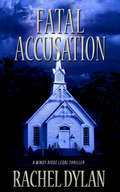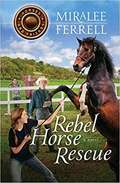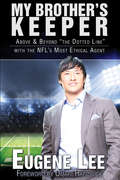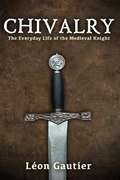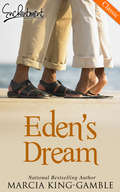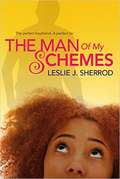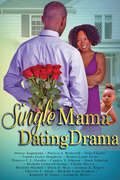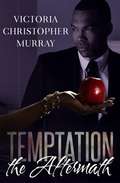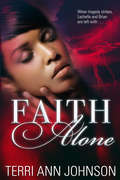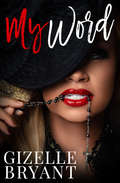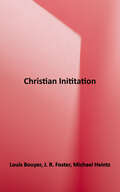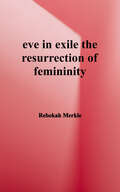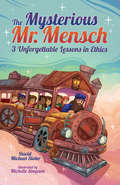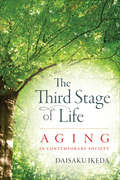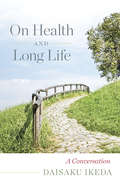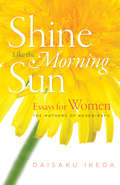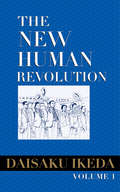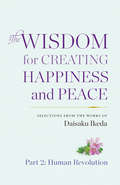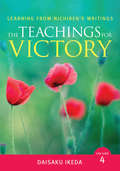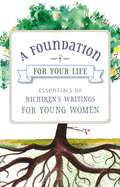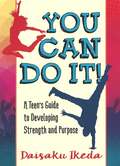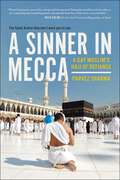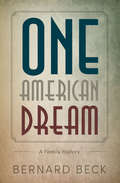- Table View
- List View
Fatal Accusation (Windy Ridge Legal Thriller Ser. #2)
by Rachel DylanA Selah Award Nominated Series Windy Ridge Legal Thriller #2 Attorney Olivia Murray hopes her life will get back to normal after a hard fought trial. But she soon finds out that the forces of evil have not given up their pursuit to win the hearts and minds of those in Windy Ridge. An embezzling scandal breaks that rocks the community church to its core. The New Age groups are ready to declare victory when a high profile prosecutor files criminal charges against the local pastor. However, Olivia is not willing to give up on the community she’s come to love. She takes on the defense pro bono knowing it could destroy her career, but it’s a case that she is called to defend. The battle will be fierce, but she’s not fighting it alone. Her friend and fellow attorney Grant Baxter is by her side. Olivia must use all the tools in her arsenal to combat those who seek to destroy the believers in the community. If Olivia can’t prove the pastor’s innocence, more than her career is on the line. The entire community of Windy Ridge could fall to the forces of darkness.
Rebel Horse Rescue: Horses and Friends
by Miralee FerrellSummer is winding down for Kate and her friends when a surprise visitor appears at her family’s stable—a beautiful bay horse wearing a halter and a bad attitude. Dubbing the horse “Rebel,” the friends set out to find the horse’s owner. Where did he come from, and why are horses all over the area disappearing from their pastures and paddocks? It’s a mystery that even the sheriff can’t figure out, so Kate decides to head up the investigation. When Kate’s autistic brother, Pete, develops a strong connection to the new arrival, Kate wonders—did God bring Rebel to them for a bigger purpose? A perfect book for kids ages 9-13, containing mystery, adventure, family values, friendships, and lots of horses! Each of the books in the Horses and Friends books can be read alone, but each one builds on the other as to character development and story line.
My Brother's Keeper: Above and Beyond "The Dotted Line" With the NFL's Most Ethical Agent
by Euguene LeeWhen it comes to professional team sports in America, the NFL is king. And where there are NFL players there are NFL agents. Sports agents have been labeled as vultures for their willingness to resort to slimy, underhanded tactics to recruit clients and make deals. Enter NFL agent Eugene Lee, whose ethics are beyond reproach.In My Brother's Keeper, we'll meet players in various stages of their NFL career—from college, to the pros, to life after the game. Eugene takes us into the homes of potential clients, the locker rooms of current clients, and anywhere else an agent must go to keep the dreams of players alive.Above all, we'll get insight into why Eugene has chosen to walk a path of righteousness, conducting business with the same integrity and faith by which he lives.Some say he's a true “Jerry Maguire,” but Eugene Lee is an original, a one-of-a-kind personality whose life is just as exciting as the games played by his clients.
Chivalry: The Everyday Life Of The Medieval Knight
by Charles A. Coulombe Leon GautierCHIVALRY has fascinated Western civilization for over a millennium, from way back when Knighthood was in flower, all the way to present day. Today, this fascination is as prevalent as it ever was, manifesting itself in works such as J.R.R. Tolkien's The Lord of the Rings. But what IS Chivalry? Is it proper manners (the lack of which, especially toward ladies, is sometimes spoken of as "Chivalry being dead")? Is it kindness? Steadfastness? It is all of those things, and much more. <P><P>Leon Gautier, the author of this magnificent book, describes it thusly: "Chivalry is the Christian form of the military profession: the knight is the Christian soldier." In a word, it is militant Christianity. But this is neither a religion confined to Sunday worship, nor a profession restricted to barracks; nor yet are the religion and the profession at all separate from each other. It is the armed defense of the unarmed Truth. <P><P>In his work, Gautier leaves no stone unturned, covering every aspect of the knight: his birth, education, marriage, everyday life, battle, and death. He also dedicates several chapters to the code of chivalry, which serves as the ten commandments of knighthood. Let Gautier take you back to a time when Christians had to defend all that they hold dear: their families, their property, their country, and their Faith.
Eden's Dream
by Marcia King-GambleAfter the tragic loss of her fiancé, Eden Sommers heads to Mercer Island, the one place she's always found peace. Instead of solace, she finds herself tormented by questions and a determination to find out what really happened to the man she loved. Romance is the last thing on her mind when she meets a man who reminds her of her fiancé. Although she's attracted to the sexy stranger, she can't help but be on guard. Is it possible to find love again, especially when her new love is keeping secrets?
The Man of My Schemes
by Leslie J. SherrodHaving a fake boyfriend comes with a real price. It started with her co-workers and then spread to her sister-friends at church: the “must-have-a-man-marriage-baby-family-right-now-because-you’re-not-getting-any-younger” fever. Tired of the merciless prying and invasive questions about her lack of a love life, thirty-four-year-old Berry Jenkins comes up with an elaborate plan to convince everyone she has finally landed the man of her dreams – she fakes it. However, her foolproof conspiracy to pretend she’s met the perfect beau turns out to be proof of foolishness as her scheme of a made-up relationship spirals out of control. Only a miracle will save Berry from her fairytale fantasy turned nightmare reality, which only worsens as her web of lies begins to unravel. Facing exposure, Berry fears that the trap she’s created for herself is too messy, too tangled – and maybe even too deadly – for her chance at love to survive.
Single Mama Dating Drama
by Michelle Mitchell Kimberly D. Taylor Monica Lynn Foster Sonia Johnston Candice Y Johnson Dwon D Moss Cherritta Smith Tomeka Farley Daugherty Leiann B Wrytes Trina Charles Patricia A Bridewell Michelle Cornwell-Jordan Michelle Lynn Stephens Jasmyne K. Rogers Denise Anquenette Charlie Marcol Princess F.L GoodenSingle Mama dating! It doesn't get anymore complicated than that. How can you find love when you have a career and kids? Where can you find that love connection? Is he on-line, in church, standing in front of the grapefruit in the grocery store? In these hilarious and heart-warming stories, you'll find single moms finding love in the most interesting of places, all while steering clear of the crazies, the lazies and definitely, the shadies. In Single Mama Dating Drama, seventeen talented writers share fictional stories about the woes, pitfalls, and joys of dating while raising kids. From Monica Lynne Foster’s explosive tale of an ex who fights for custody of his child while fighting to gain his ex-wife back from her newfound love…to Dwon D. Moss’ hilarious Internet dating spin on a widow who runs into a holy roller, a pretty boy and a liar….to Candice Y. Johnson’s laugh-out-loud take on a mama whose baby girl prophetically dismisses all of her potential suitors…to Denise Anquenette’s story of how one woman's attempt to take back control of her life strains the bonds and boundaries of her relationship with her children…..to Michelle Mitchell’s sticky tale of a woman who meets her mate at a sperm bank…. these captivating stories are sure to make you laugh, shake your head, clutch your pearls, and cheer for these mamas and all their dating drama!
Temptation: The Aftermath
by Victoria Christopher MurrayThe best of friends…. Since they were five years old, Jasmine Cox Larson Bush and Kyla Blake had a bond that could not be broken. They shared secrets, marked milestones, and held each other up through life’s adversities. It was a friendship that they both thought would last forever. But when Jasmine’s jealousy led her to seduce Kyla’s husband, Dr. Jefferson Blake, that bond was severed and their friendship was damaged forever…. The worst of times…. Now, twenty years later, a major tragedy brings the two together when Jefferson, in New York for a medical convention, is shot in an attempted robbery. It’s the love that Jasmine once had for Kyla that sends her rushing to the hospital to be by her friend’s side. Kyla, despondent and distraught, just wants answers….and when a mysterious woman appears, it’s Jasmine who believes that woman may hold the key to what happened to Jefferson. While Kyla doesn’t believe that this woman has any meaning, Jasmine is not so sure. Will Jasmine uncover a secret that Jefferson is hiding? And when she does find out the truth, what will she do with it? Will she destroy Kyla’s life or will she do anything to protect her friend from the same devastation that she caused her twenty years before? In a riveting twenty-year anniversary sequel to the bestselling Temptation, Victoria Christopher Murray weaves a tale of what happens once friendships are bonded, then broken and all the consequences of the aftermath.
Faith Alone
by Terri Ann JohnsonLachelle Jackson appears to have it all; a husband who adores her; a job that fulfills her and friends that love her unconditionally. When Lachelle learns that she is pregnant, what should be the best experiences of her life becomes one of the darkest times she ever endured. Facing a life-threatening pregnancy, in the midst of insurmountable grief, can Lachelle find the strength to fight for her life and that of her unborn baby? Can she overcome depression and move beyond memories of her past to accept God’s greatest gift…LOVE?
My Word
by Gizelle BryantAfter marrying her college sweetheart, Ginger Williams gave up her own professional dreams to help her husband follow his dream of building a megachurch. It’s not long before Ginger and her husband, Jeremy, turn a small D.C. church into a burgeoning empire….catapulting the couple into a popular powerhouse. But with a bigger spotlight comes more temptation…and the power is corrupting Jeremy in ways Ginger never imagined. When she seeks the advice of her peers on the First Ladies’ Council, she’s shocked when they tell her to accept Jeremy’s infidelities so she doesn’t damage the church and affect the many business opportunities coming their way. With every part of her life—family faith, and finances—hanging in the balance, Ginger must decide if she will continue to live in the shadow of the sins of her husband…or face life on the other side of the pulpit.
Christian Initiation
by Louis BouyerChristian Initiation, first published in 1958, serves in many ways as a point of entry for the magnificent theological oeuvre of Louis Bouyer. Addressing the central elements of the Christian faith in a simple and straightforward manner, the book is meant as an initiation into Christian truth and life for those who profess—or hope to profess—faith in Jesus Christ. <p><p>Each chapter is a “discovery” of that new life that Christ brings to the believer, infusing each and every experience with the light of his own risen glory. In Christian Initiation, as in all his works, Bouyer emphasizes that the truth of the Gospel is a life to be lived in Christ Jesus and passed along, through sacramental grace, to his disciples for the joyful integration of truth and life.
Eve In Exile: And the Restoration of Femininity
by Rebekah MerkleThe swooning Victorian ladies and the 1950s housewives genuinely needed to be liberated. That much is indisputable. So, First-Wave feminists held rallies for women's suffrage. Second-Wave feminists marched for Prohibition, jobs, and abortion. Today, Third-Wave feminists stand firmly for nobody's quite sure what. But modern women -- who use psychotherapeutic antidepressants at a rate never before seen in history -- need liberating now more than ever. The truth is, feminists don't know what liberation is. They have led us into a very boring dead end. Eve in Exile sets aside all stereotypes of mid-century housewives, of China-doll femininity, of Victorians fainting, of women not allowed to think for themselves or talk to the men about anything interesting or important. Once those fictionalized stereotypes are out of the way -- whether they're things that make you gag or things you think look pretty fun -- Christians can focus on real women. What did God make real women for?
The Mysterious Mr. Mensch: 3 Unforgettable Lessons in Ethics
by David Michael SlaterFrom the best-selling author of Mysterious Monsters, comes The Mysterious Mr. Mensch, an early chapter book series full of magic, adventure, and learning opportunities for young readers of all backgrounds. In each story, Mr. Mensch will instill in kids, in the most memorable and exciting ways, possible, positive values and important life lessons. You've heard of the Magic School Bus, where kids learn science. Now, we help them learn about ethics aboard The Magical Meshugenahmobile!
The Third Stage of Life: Aging in Contemporary Society
by Daisaku IkedaBuddhist philosopher, peace activist and octogenarian Daisaku Ikeda has spent a lifetime studying and teaching about life’s universal sufferings of birth, aging, sickness and death. His life exemplifies the health and happiness possible from a compassionate practice of Nichiren Buddhism. In The Third Stage of Life, a dialogue with two Japanese journalists, he shares his insights on how to make one’s golden years a “third youth.” What’s the secret to living long? What are the keys to a healthy life? Is aging a period of decline or an opportunity to bring one’s life to a satisfying conclusion? What example can we set for in others in our third stage of life? Drawing on the lives of many individuals down through the ages, Mr. Ikeda discusses these and many other questions that affect us as we grow older. From the practical to the spiritual to the personal—as when his wife of sixty years joins the discussion in later chapters—The Third Stage of Life will inspire you to keep challenging and lead a life that shines.
On Health and Long Life: a Conversation
by Daisaku IkedaAlways concerned about the most basic problems confronting humanity, SGI President Ikeda here once again explores the four universal sufferings of birth, aging, sickness, and death. In conversation with doctors and nurses, the SGI leader skillfully weaves Buddhist insights with the practical knowledge and personal experiences of his dialogue partners. • What can we learn from our illnesses? • How is the patient’s attitude crucial to healing? • How do parents affect their children’s health? • How much are our lives determined by our genes? What are constructive ways to approach aging? • What are keys for effective health care? • What roles do faith and SGI activities play in a long and fulfilling life? The answers to these and other questions in On Health and Long Life provide valuable perspectives to caring for the most valuable of treasures: our lives themselves.
Shine Like the Morning Sun: Essays for Women, The Mothers of Kosen-Rufu
by Daisaku IkedaIn this collection of essays for women, SGI President Ikeda sings the praises of the “mothers of kosen-rufu” for their strength, wisdom, and faith. Filled with stories of women he’s met or women from history, Shine Like the Morning Sun explores Buddhist philosophy from myriad angles. Women of all ages will discover guidelines to live by and inspiration to spread sunshine in their families, communities, and the SGI’s movement for peace and happiness.
The New Human Revolution, Volume 1, Revised Edition
by Daisaku IkedaThrough this novelized history of the Soka Gakkai-one of the most dynamic, diverse, and empowering Buddhist movements in the world today-readers will discover the organization’s goals and achievements even as they find inspiring and practical Buddhist wisdom for living happily and compassionately in today’s world. The book recounts the stories of ordinary individuals who faced tremendous odds in transforming their lives through the practice of Nichiren Buddhism and in bringing Buddhism’s humanistic teachings to the world. This 1st volume looks at events that occurred in 1960 when Soka Gakkai was first brought to North and South America from Japan. This inspiring narrative provides readers with the principles with which they can positively transform their own lives for the better and realize enduring happiness for themselves and others.
Wisdom for Creating Happiness and Peace, Part 2, Human Revolution: Selections from the works of Daisaku Ikeda
by Daisaku IkedaGleaned from more than fifty years of SGI President Ikeda’s works, The Wisdom for Creating Happiness and Peace provides a window into the SGI president’s thought and philosophy. His words are a boundless source of inspiration. They embody a universal message of hope and courage for a world increasingly beset with sorrow and suffering. Chapters in this volume: “What Is Human Revolution?”; “It Is the Heart That Is Important”; “Buddhism Is About Winning”; “Transforming Karma Into Mission”; “Illness Gives Rise to the Resolve to Attain the Way”; “The Principle of Cherry, Plum, Peach, and Damson”; “You Will Grow Younger, and Your Good Fortune Will Accumulate”; “Faith for Overcoming Obstacles”; “Faith for a Harmonious Family”; “Making the Most of Each Day”; “Message for Youth”.
The Teachings for Victory, Volume 4 (Learning from Nichiren's Writings)
by Daisaku IkedaNichiren Daishonin’s writings provide a practical formula for enabling all people to achieve victory in every aspect of their lives and attain an unshakable state of happiness. This volume of Learning from Nichiren’s Writings: The Teachings for Victory contains SGI President Daisaku Ikeda’s lectures on nine of Nichiren’s letters: “On the Real Aspect of the Gohonzon” “The Four Virtues and the Four Debts of Gratitude” “A Ship to Cross the Sea of Suffering” “Flowering and Bearing Grain” “General Stone Tiger” “Reply to Niiama” “The Workings of Brahma and Shakra” “Reply to Yasaburo” “The Three Obstacles and Four Devils” President Ikeda elucidates the importance of studying Nichiren’s writings as the foundation of Nichiren Buddhism as practiced by the Soka Gakkai International. His lectures bring Nichiren’s immense wisdom, compassion, and courage into focus for the present age. In reading and studying these lectures, we learn how to apply in daily life Nichiren’s profound philosophy for inner transformation and victory for both ourselves and others. The Teachings for Victory will empower you to develop the strength and wisdom to bring forth your inherent potential.
A Foundation For Your Life: Essentials of Nichiren's Writings for Young Women
by Soka GakkaiA Foundation for Your Life is the perfect companion for your Buddhist study. One hundred passages have been carefully selected from thirty writings of Nichiren that the young women's division has made its focus. The commentary accompanying each passage highlights key points, and the words from SGI President Ikeda offer clear guidance you can put into practice today. <p><p> Easy to read yet full of life-changing principles, A Foundation for Your Life is sure to become a source of inspiration you will turn to time and time again.
You Can Do It: A Teen's Guide to Developing Strength and Purpose
by Daisaku IkedaFriends, family, school. This crazy world. Problems and worries seems too much. Your dreams seem so far away. <P><P>How do you have hope? How do you believe in yourself? How do you find the right path for you? How can you connect your today with the tomorrow of your dreams? <P><P>In these short conversations with young people, SGI President Ikeda offers timeless and practical advice that is sure to comfort, challenge, and inspire you. The treasures he shares are just what you need to help you find the answers that lie within you. You Can do it!
The New Human Revolution, Volume 3
by Daisaku Ikeda<p>This ongoing novelized history of the Soka Gakkai, contains not only episodes from the past but timeless guidance in faith. <p>Chapter Summary: <p>Chapter 1: Westward Transmission New Year's Day, 1961-The Year of Dynamic Advancement-SGI President Shin'ichi Yamamoto wrote the waka poem indicating his plans to travel to Asia. <p>Chapter 2: India Taking off from Hong Kong, Shin'ichi Yamamoto travels to Colombo, Ceylon on his first flight over Southeast Asia. <p>Chapter 3: The Buddha Shakyamuni realized his present existence as he sat meditating under the peepul tree. He had attained a profound awakening; he had finally become a Buddha. <p>Chapter 4: Light of Peace Shin'ichi Yamamoto visits Eagle Peak, Patna Museum and then Calcutta where the great Indian poet, Rabindranath Tagore had lived and had spent his final days.</p>
You Are A Genius At Something: 201 Ideas To Help You Shine
by Daisaku IkedaYou Are a Genius at Something: 201 Ideas to Help You Shine
A Sinner in Mecca: A Gay Muslim's Hajj of Defiance
by Parvez SharmaFrom the recipient of a 2018 Guggenheim Fellow Based on the New York Times' Critic Pick documentary "The first book about the Hajj from a gay perspective, written by a man with a deep knowledge of Islamic history. This pilgrimage is the centerpiece of his book, and he recounts it with courage and fierce emotion." —The Guardian This is the Islam you've never been allowed to see. Daringly reported from its frontlines and forbidden to most of humanity for centuries. The Hajj pilgrimage is a journey every Muslim is commanded by God to go on at least once in a lifetime if they are able and, like millions, Parvez Sharma believes his spiritual salvation lies at Islam's ground zero, Mecca. But unlike the journeys of his fellow Muslims, the consequences of his own could be deadly. In A Sinner in Mecca, author, filmmaker, and 2018 Guggenheim Fellow Parvez chronicles his pilgrimage as a very openly gay Muslim to Saudi Arabia, where Islam's heart beats . . . and where being true to himself is punishable by death. Risking his life, Parvez embarks on a Jihad of the self—filming his experience along the way. Already under fire for his documentary A Jihad for Love, which looks at the coexistence of Islam and homosexuality, he would undoubtedly face savage punishment if exposed—from being thrown off a cliff to public beheading. Parvez's odyssey is at once audacious, global, and remarkable. He meets everyone from extremists to explorers of the spiritual kind and the world they open up is frightening . . . yet breathtaking. In Mecca, Parvez comes out to a pilgrim, who then asks him why he would want to be part of something that wants no part of him. This book is his answer to this question and many more. Parvez provides an unflinching look at our troubling unfolding history, including Hizbullah, ISIS, Trump, the race-wars, an embattled Europe, and more. He offers real solutions, borne of his efforts to get his hands dirty to find them. This is a lived history—and its author is no armchair theorist. Following the New York Times Critics' Pick hit documentary of the same title, A Sinner in Mecca unflinchingly showcases parts of the dangerous ideology that governs today's ISIS and how much it has in common with Saudi Arabia's sacred, yet treacherous dogma, Wahhabi Islam. A Sinner in Mecca is simultaneously one man's personal odyssey as well as a groundbreaking, provocative revelation of a clandestine world and its fastest growing and most contested religion.
One American Dream: A Family History
by Bernard BeckThe only thing Jack Rubin ever wanted was to be a real American. A Jewish immigrant from Poland, he arrives in New York City in the late 1800s and begins his American journey by pulling himself up by the bootstraps. But his success doesn't satisfy him, and when he struggles while raising a headstrong daughter through the roaring twenties, he feels like a failure. Only when he finds himself helping those less fortunate during the Great Depression does Jack realize that he's been a real American all along.
